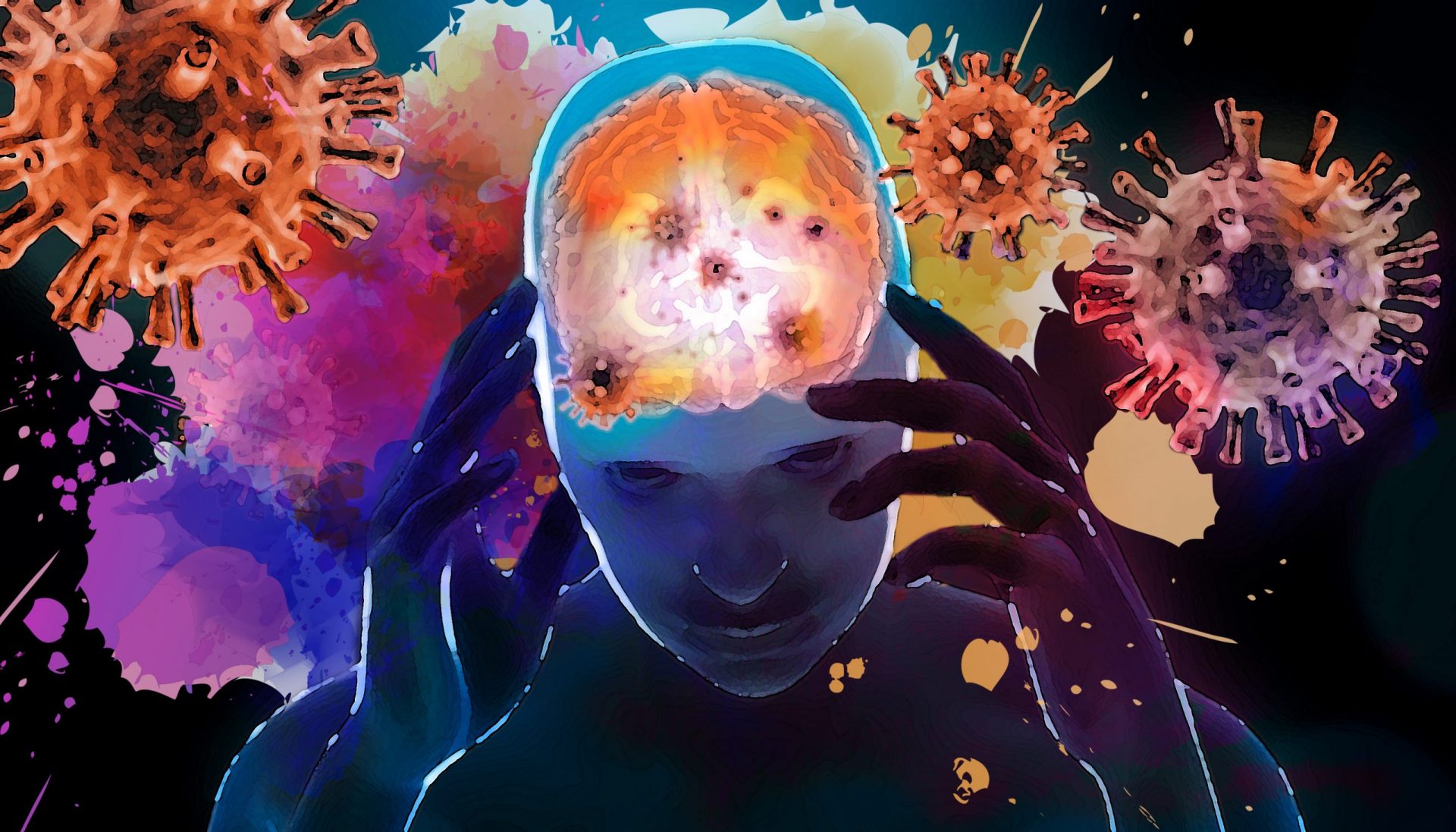
Association between COVID-19 and psychiatric illnesses – a summary of different articles
In this section
A recent study by Taquet et al.1 from Oxford University was published in The Lancet Psychiatry showing that COVID-19 might have a bidirectional association with mental disorders, especially anxiety, insomnia and dementia.
The study evaluated the health records of 69 million people in the US, from which more than 62.000 were diagnosed with COVID-19, making it the largest study in this topic, using carefully matched control groups and large-scale real-world data.1
After accounting for known risk factors for COVID-19, such as underlying physical condition, sex, age and ethnicity, the study showed that 18.1% of COVID-19 survivors developed a psychiatric illness within 14-90 days of receiving their COVID-19 diagnosis, from which 5.8% had their first ever psychiatric diagnosis1
To uncover whether the excess risk was in fact due to COVID-19, researchers compared the data with six other health conditions: influenza; other respiratory tract infections; skin infection; cholelithiasis (gallstones); urolithiasis (urinary tract stones); and the fracture of a large bone.1 In these groups, the estimated incidence of receiving first diagnosis of a mental illness ranged from 2.5 to 3.4%, compared to the 5.8% in the COVID-19 group.1 So, the findings suggest that COVID-19 survivors have a doubled risk of receiving their first psychiatric diagnosis.1 This risk was greatest for anxiety disorders (all major categories), insomnia and dementia.1 The authors suggest that insomnia might occur as a result of disturbances in the circadian rhythm, however, the cause of increased risk for dementia and anxiety is unknown.1
In addition, the study found an association between having a psychiatric diagnosis and an increased risk of COVID-19.1 Individuals with a recorded psychiatric diagnosis in the past 3 years were 65% more likely to be diagnosed with COVID-19 compared to those without a psychiatric diagnosis, even after controlling for their housing and economic circumstances.1 Although the exact mechanisms via which having a psychiatric illness increases the risk of COVID-19 are unknown, the authors suggest that possible explanations might include behavioural factors (e.g., less adherence to safety measures, like social distancing), other residual lifestyle factors (e.g., smoking), or the pro-inflammatory state that is present in certain mental illnesses or is induced by psychotropic medication.1
Although it seems obvious that being diagnosed with a novel virus that can potentially be life-threatening induces stress and anxiety in patients, the explanation for why survivors are more likely to develop psychiatric illnesses is more complex.1 Several reports were published about COVID-19 patients who developed neurological problems, including inflammation and swelling of the brain tissues2, stroke3, haemorrhages2, and mental confusion.4 Furthermore, a meta-analysis5 assessed the psychiatric and neuropsychiatric effects of previous diseases caused by coronavirus, namely the severe acute respiratory syndrome (SARS) and Middle East respiratory syndrome (MERS) with the aim of gaining a better understanding of the possible psychiatric consequences of COVID-19.5 Among hospitalised patients with acute symptoms, confusion (delirium), anxiety, depressed mood, impaired memory and insomnia were present, while in the post-illness stage, insomnia, anxiety, irritability, fatigue and impaired memory were observed in patients.5 These findings suggest that coronavirus might be linked to psychiatric disturbances, supporting the findings of the Oxford study.1
Although the investigation of the relationship between COVID-19 and neurological/psychiatric disorders is still in its infancy and is yet to be more thoroughly explored, so far it seems that COVID-19 can affect the central nervous system, linking it directly to the development of psychiatric disorders.1
References
- Taquet, M., Luciano, S., Geddes, J. R. & Harrison, P. J. Bidirectional associations between COVID-19 and psychiatric disorder : retrospective cohort studies of 62 354 COVID-19 cases in the USA. The Lancet Psychiatry 0366, 1–11 (2020).
- Varatharaj, A. et al. Neurological and neuropsychiatric complications of COVID-19 in 153 patients: a UK-wide surveillance study. The Lancet Psychiatry 7, 875–882 (2020).
- Ellul, M. A. et al. Neurological associations of COVID-19. Lancet Neurol 19, 767-783. (2020).
- Paterson, R. W. et al. The emerging spectrum of COVID-19 neurology: clinical, radiological and laboratory findings. Brain 143, 3104–3120 (2020).
- Rogers, J. P. et al. Psychiatric and neuropsychiatric presentations associated with severe coronavirus infections: a systematic review and meta-analysis with comparison to the COVID-19 pandemic. The Lancet Psychiatry 7, 611–627 (2020).
VALIDATION OF THE PANSS IN TWO-FACT…
This study by Kaliuzhna et al. aimed to validate whether the Positive and Negative Symptom Scale (PANSS) maintains the two-factor distinction between amotivatio
more…OUR PRODUCT’S BENEFITS IN THE LONG …
Atypical antipsychotics need to be effective across the span of illness in patients with schizophrenia. When patients experience acute exacerbation of psychotic
more…


